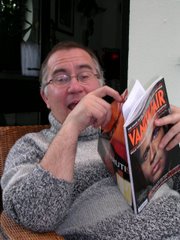Let's say you were interested in the subject but didn't know the Journal had written an article on it. You might type into a search engine some combination of keywords like "Green Beans," "coffee," "U.S. military," "bases" and "soldiers." Various combinations failed to return a link to the article in the first page of results on Google. Using all of the keywords and terms separated like that did find the article, but not on The Wall Street Journal site. Instead, it was on a blog site that had reposted the article word for word.
News organizations that generate revenue from advertising are keenly aware of the problem and are using coding techniques and training journalists to rewrite the print headlines, thinking about what the story is about and being as clear as possible. The science behind it is called SEO, or search engine optimization, and it has spawned a whole industry of companies dedicated to helping Web sites get noticed by Google's search engine.
It's clearly having an impact.
In November, Nielsen/NetRatings ranked Boston.com, the sister Web site of The Boston Globe, as the fourth-most trafficked newspaper Web site in the country, even though its print circulation is ranked 15th by one audit bureau. "We're regularly beating the bigger boys, like the Chicago Tribune and The Wall Street Journal...and part of the reason is SEO," said David Beard, editor of Boston.com and former assistant managing editor of its print sibling, The Boston Globe.
"We have Web 'heds.' We go into the newspaper (production) system to create a more literal Web headline," said Beard. "We've had training sessions with copy editors and the night desk for the newspaper. It's been a big education initiative."
The Times Online, which is based in the United Kingdom and is a division of News Corp., gets anywhere from 30 percent to 60 percent of its traffic from search engines, said Times Online Publisher Zach Leonard. The site modifies headlines it imports onto the Web site from its print affiliates, The Times and The Sunday Times. The company also started training its editorial staff on SEO last summer and is investing in a new content management system that will launch with a new Web site soon, he said.
SEO nixes classic heads!Newspaper headlines lost in Web translation
Search engine optimization expert Stephan Spencer evaluates 14 famous newspaper headlines for search suitability.
"Nine to 12 months ago, if you said 'SEO' to most of the (news) team they would scratch their head. Now it's a part of their job," Leonard said. "We have to recognize that search is driving much of the behavior on the Web. Newspapers that don't understand that at the highest level, all the way up to the editors, simply won't exist."
The Wall Street Journal is a unique case. Most of its content is walled off from the public Internet and accessible only through subscription. This particular article was among the free content and visible to search engines.
To rank high in the search engines, the Journal headline should have included the term "coffee," "cafes," or even "Starbucks," said Stephan Spencer, founder and president of SEO firm Netconcepts.
"For one thing, 'green beans' isn't a terribly popular search term," he said. "Secondly, a fraction of those searchers will be looking for the coffee supplier; most will be looking for recipes." His suggested headline: "U.S. Military Coffee Supplier to take on Starbucks with Cafes Stateside."
That might seem a bit unwieldy to many journalists, but Spencer assures that a balance can be reached between being straightforward and fun. Newspapers are increasingly jumping on the SEO bandwagon to stay alive.
Spencer recommends that Web sites not only use keywords in the headline, but also include a more descriptive, keyword-rich version of the headline in the title tag, which appears in the blue bar at the very top of the browser window when looking at a Web page. He also suggests that Web sites use keywords in the anchor text, which is the underlined text in a hyperlink. A keyword carries more weight in search engines if it is located at the beginning of a headline, he said.
Other SEO tricks include frequently and consistently interlinking between related stories and items on a Web site and tagging the content accurately across the Web page, including changing headers and tabs on pages to mundane, rather than cleverly named, terms.
CONTINUED: Taking on the SEO challenge...
Newspapers search for Web headline magic CNET News.com


No comments:
Post a Comment